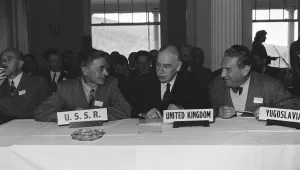International Security is America's leading peer-reviewed journal of security affairs.
Overview
Are mature democracies better at making foreign policy than other kinds of regimes? Do their robust civic institutions and a flourishing marketplace of ideas reduce the likelihood of inflated threat assessments and “myths of empire” that can lead to risky foreign policies and, in some cases, war? To answer these questions, Chaim Kaufmann of Lehigh University examines the 2002–03 U.S. debate over going to war against Iraq. Kaufmann concludes that the democratic marketplace of ideas failed to challenge President George W. Bush’s case for toppling Saddam Hussein—despite the existence at the time of information that exposed the speciousness of many of the claims of the president’s foreign policy team. Kaufmann traces this failure to the Bush administration’s successful efforts to withhold or manipulate information that would have substantially weakened their argument for invading Iraq. He considers the implications of this strategy for U.S. foreign policy given the administration’s preventive war doctrine.
Kaufmann, Chaim. “Threat Inflation and the Failure of the Marketplace of Ideas: The Selling of the Iraq War.” Summer 2004



